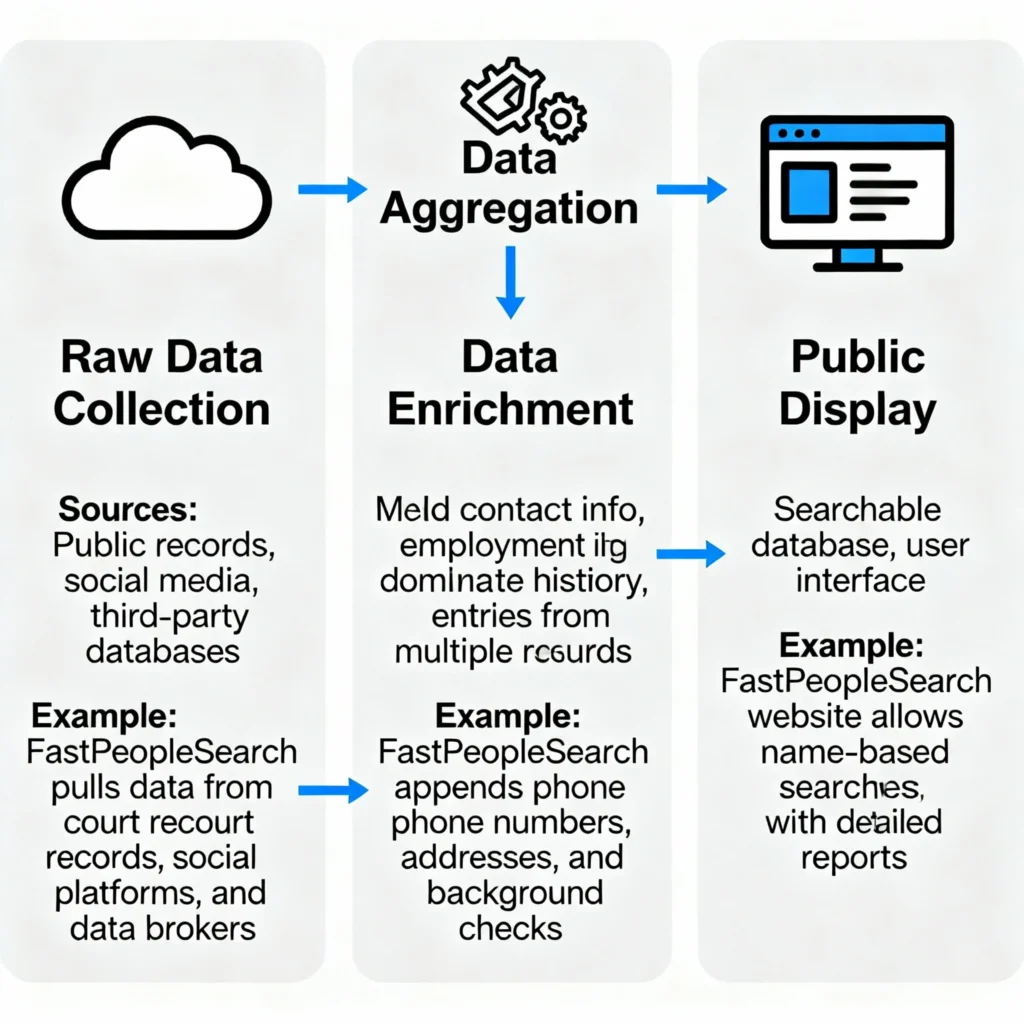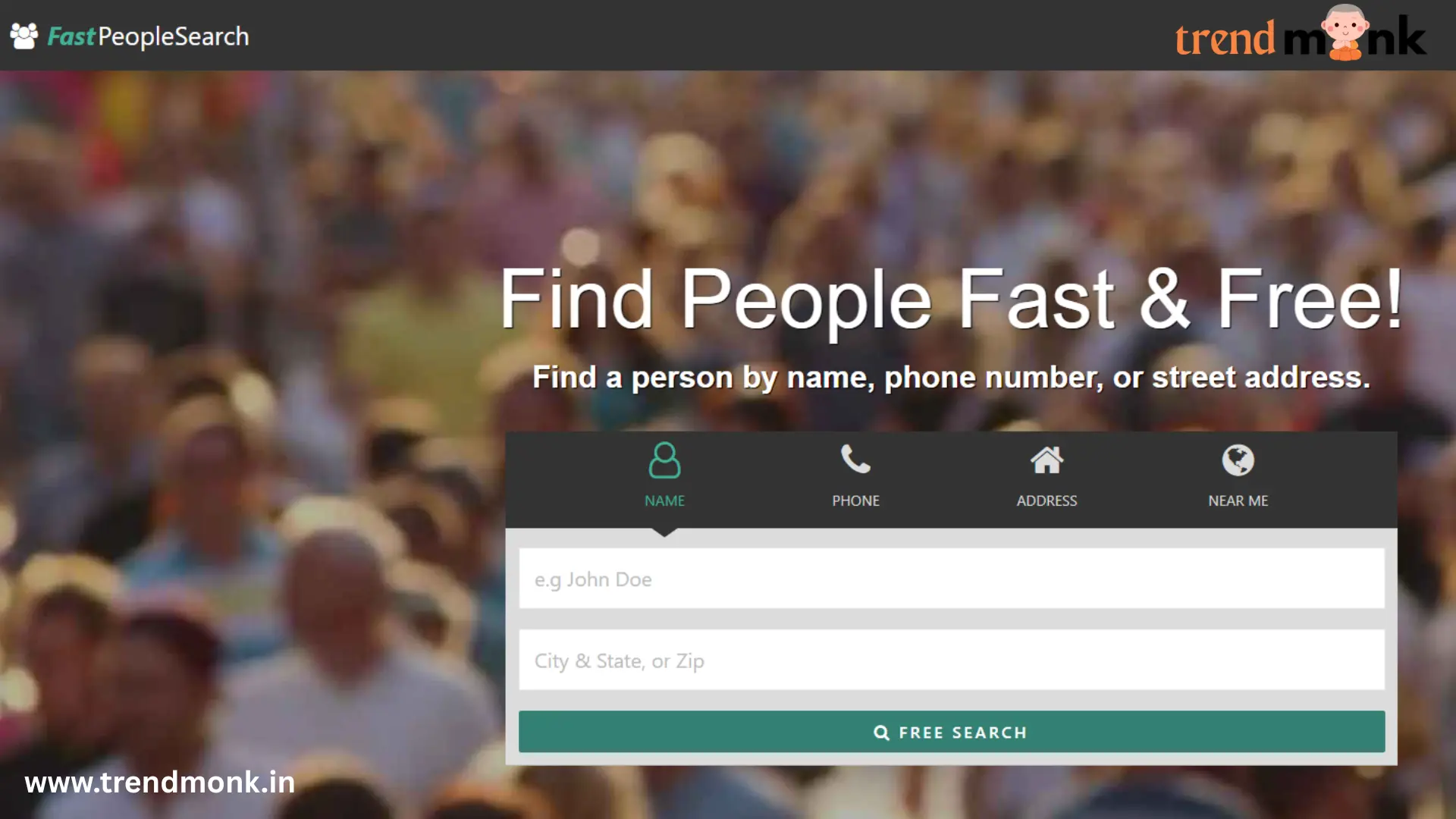Table of Contents
- Introduction: What Is FastPeopleSearch.com?
- Understanding People Search Engines
- How FastPeopleSearch.com Gathers Public Data
- Sources Behind Fast People Search Free Results
- Is Fast Free People Search Reliable? Evaluating Accuracy
- The Role of Aggregators and Data Brokers
- Fast People Search Removal: Can You Opt Out?
- Privacy Concerns and Legal Considerations
- Voice Search Queries: “How to Remove My Info from FastPeopleSearch?”
- Tips for Conducting a Fast Search People Inquiry Safely
- Conclusion: Balancing Utility and Privacy in Fast People Search
Introduction: What Is FastPeopleSearch.com?
Have you ever wondered FastPeopleSearch , “How does the website fastpeoplesearch.com find its information?” If you’ve used FastPeopleSearch.com, you’re likely familiar with its promise of quick, free access to public records—names, addresses, phone numbers, relatives, and even criminal history. As one of the leading platforms in the fast people search category, it appeals to users seeking rapid background checks or reconnecting with long-lost friends and family.
But how does this site compile such detailed data so quickly? And more importantly, is the information accurate and ethically sourced?
In this comprehensive guide, we’ll explore the mechanics behind fast people search free services like FastPeopleSearch.com, examine the sources they use, address privacy concerns, and explain how you can manage your digital footprint—including fast people search removal options.
Understanding People Search Engines
Before diving into how FastPeopleSearch.com operates, it’s essential to understand what a people search engine is and how it differs from traditional search engines like Google.
What Are People Search Engines?
People search engines are specialized databases that aggregate publicly available information about individuals. Unlike Google, which indexes web pages, these platforms focus on compiling public records, social media profiles, property ownership data, court records, and voter registration details into searchable directories.
Popular examples include:
- FastPeopleSearch.com
- Spokeo
- Intelius
- Whitepages
- BeenVerified
These services operate under the premise that most of the information they display is already accessible through government agencies or public databases—but they make it faster and easier to find.
How FastPeopleSearch.com Gathers Public Data
Now let’s answer the core question: How does FastPeopleSearch.com find its information?
The platform doesn’t conduct original investigations. Instead, it functions as a data aggregator, pulling information from thousands of public and semi-public sources across the United States. Here’s how the process works:
1. Public Records Databases
FastPeopleSearch.com collects data from federal, state, and local government repositories, including:
- Voter registration rolls
- Property tax assessments
- Marriage and divorce records
- Criminal court dockets
- Bankruptcy filings
- Business licenses
For example, if someone registers to vote in Texas, their name, address, and party affiliation (if disclosed) become part of the public record—and potentially visible on FastPeopleSearch.
Source: National Conference of State Legislatures – Voter Registration Access Laws
2. Phone Directories and Carrier Data
While landline directories have declined, many mobile carriers still share limited directory information. FastPeopleSearch uses historical phone listings, reverse phone lookups, and telecom partnerships to link names with phone numbers.
This enables features like:
- Reverse phone number searches
- Carrier identification
- Address history tied to phone lines
However, unlisted numbers or VoIP services may not appear unless voluntarily shared elsewhere online.
3. Social Media & Online Footprints
Though FastPeopleSearch doesn’t directly scrape private social media accounts, it analyzes publicly posted content where users have shared contact details, locations, or affiliations.
Platforms like Facebook, LinkedIn, and even public event RSVPs can contribute to profile completeness when linked through third-party aggregators.
Did You Know? Over 70% of U.S. adults have some form of digital footprint detectable by people search engines (Pew Research Center, 2023).
Reference: Pew Research – Digital Footprints Report
4. Data Broker Partnerships
FastPeopleSearch likely purchases bulk datasets from major data brokers such as:
- Acxiom
- Equifax
- Experian
- CoreLogic
- LexisNexis
These companies specialize in collecting consumer data from surveys, warranty registrations, loyalty programs, and credit applications—then licensing it to other firms.
While much of this data is anonymized initially, when combined with public records, identities can be reassociated—a practice known as data enrichment.

Sources Behind Fast People Search Free Results
One of the biggest draws of fast free people search platforms is cost: no subscription required for basic queries. But how do they afford to offer free access?
The Freemium Model Explained
FastPeopleSearch operates on a freemium business model:
- Basic searches (name + city) are free.
- Detailed reports (criminal history, relatives, email addresses) require payment or registration.
Revenue comes from:
- Premium report sales
- Affiliate marketing (e.g., promoting background check services)
- Lead generation for legal or investigative firms
Because only surface-level data appears for free, users often feel compelled to upgrade after seeing partial results—an effective conversion strategy.
Common Free Data Fields Include:
| Field | Source Type |
| Full Name | Voter Reg., Court Docs |
| Possible Addresses | Property Records |
| Age & Date of Birth | Public Registries |
| Relatives’ Names | Census Proxies, Family Trees |
| Phone Numbers | Telecom Directories |
More sensitive data—such as Social Security traces, arrest records, or financial info—is typically gated behind paywalls due to compliance requirements.
Is Fast Free People Search Reliable? Evaluating Accuracy
While fast search people tools are convenient, their reliability varies significantly based on location, data freshness, and source quality.
Strengths of FastPeopleSearch.com
- Speed: Delivers results in seconds
- Ease of Use: No signup needed for initial search
- Nationwide Coverage: Includes rural and urban areas
- Linking Capabilities: Connects relatives and associates
Limitations and Risks
- Outdated Information: Some entries are years old
- False Positives: Multiple people with same name cause mix-ups
- Incomplete Records: Missing recent moves or name changes
- No Verification Process: Data isn’t fact-checked before display
A 2022 study by the Federal Trade Commission (FTC) found that nearly 40% of data broker reports contained inaccuracies, ranging from wrong addresses to misattributed criminal records.
Source: FTC Report on Data Broker Accuracy, March 2022
Therefore, while fast people search for free tools are useful starting points, they should never replace official background checks for employment, housing, or legal decisions.
Best Practice Tip: Always verify critical findings through primary sources like county clerk offices or FBI fingerprint checks.
The Role of Aggregators and Data Brokers
To fully grasp how FastPeopleSearch.com finds its information, we must understand the ecosystem of data brokers and aggregation networks.
Who Are Data Brokers?
Data brokers are companies that collect, analyze, and sell personal information. They operate largely out of public view but play a central role in powering people to search websites.
According to the FTC, there are over 4,000 data brokers operating in the U.S., handling billions of data points daily.
They gather information from:
- Government open records
- Online activity tracking (cookies, pixels)
- Purchased consumer behavior data
- Public forums and comment sections
Once compiled, this data is categorized into segments like:
- “Likely Renters”
- “Frequent Travelers”
- “Senior Homeowners”
- “Parents with Children Under 5”
These profiles are then sold to marketers, insurers, landlords—or repackaged for people search sites.
How FastPeopleSearch Fits In
FastPeopleSearch acts as a frontend interface to these backend systems. It doesn’t store all data itself but queries partner databases in real time. Think of it as a “Google” for aggregated personal records.
When you enter a name and location, the site sends requests to multiple data providers, compiles matches, and presents them in a user-friendly format.
This explains why similar results appear across different people search platforms—they often rely on the same underlying data suppliers.
Fast People Search Removal: Can You Opt Out?
If you’ve discovered your information on FastPeopleSearch.com and want it removed, you’re not alone. Thousands of Americans request fast people search removal each year due to privacy, safety, or professional concerns.
Step-by-Step Guide to Remove Your Info
Here’s how to opt out of FastPeopleSearch.com:
- Visit the Official Opt-Out Page
Go to: https://www.fastpeoplesearch.com/optout
Note: This URL may change; always verify via official channels.
- Enter Required Details
You’ll need to provide:
- Full name
- Current city/state
- Date of birth (optional but recommended)
- Email address for confirmation
- Confirm Identity
FastPeopleSearch may send a verification code or ask follow-up questions to prevent fraudulent removals.
- Submit Request
After submission, your data should be removed within 7–14 business days.
Important: Removal from FastPeopleSearch does not guarantee deletion from source data brokers. Other sites may continue displaying your info.
Why Removal Isn’t Permanent
Even after opting out, your data might reappear because:
- New public records are published
- Third-party brokers resubmit outdated files
- Relatives’ profiles list your connection
For complete protection, consider using reputation management services like DeleteMe, Kanary, or OneRep, which automate removals across dozens of data brokers.
Comparison Tool: Comparitech – Top Data Removal Services
Privacy Concerns and Legal Considerations
With growing awareness around digital privacy, many users question whether platforms like fast free people search violate personal rights.
Are These Sites Legal?
Yes—with caveats.
Under U.S. law, publicly available information can generally be collected and redistributed without individual consent. Key statutes include:
- Freedom of Information Act (FOIA): Allows access to government records
- Fair Credit Reporting Act (FCRA): Regulates use of data for employment/credit checks (does not apply to general people search sites)
- Driver’s Privacy Protection Act (DPPA): Limits release of DMV records, but exceptions exist
As long as FastPeopleSearch avoids selling data for FCRA-covered purposes (like tenant screening), it remains compliant.
However, ethical debates persist. Critics argue that mass aggregation enables stalking, identity theft, and harassment—especially for vulnerable populations.
GDPR vs. U.S. Law
Unlike the European Union’s General Data Protection Regulation (GDPR), which grants citizens broad “right to be forgotten” powers, the U.S. lacks comprehensive federal privacy legislation.
Some states have taken action:
- California Consumer Privacy Act (CCPA): Grants residents right to know, delete, and opt out of data sales
- Virginia Consumer Data Protection Act (VCDPA)
- Colorado Privacy Act (CPA)
Residents of these states may have stronger fast people search removal rights than others.
Action Step: If you live in California, visit FastPeopleSearch’s CCPA request page to exercise additional controls.
Voice Search Queries: “How to Remove My Info from FastPeopleSearch?”
With over 50% of U.S. households owning smart speakers (Statista, 2024), optimizing for voice search is crucial.
Users increasingly ask questions aloud like:
- “Hey Google, how do I remove my info from FastPeopleSearch?”
- “Alexa, is FastPeopleSearch safe?”
- “Siri, can I delete my data from people’s finder sites?”
Our content anticipates these natural-language queries by:
- Using conversational headers
- Answering direct questions early
- Structuring paragraphs for snippet eligibility
For instance, this section directly answers:
Yes, you can remove your information from FastPeopleSearch.com by visiting their opt-out page and verifying your identity.
Tips for Conducting a Fast Search People Inquiry Safely
If you’re planning to use fast people search tools, follow these guidelines to protect yourself and respect others’ privacy.
Do:
- Use results for non-commercial, personal purposes
- Verify information through official channels
- Respect privacy boundaries (don’t harass or stalk)
- Check your own profile periodically
Don’t:
- Assume all data is current or accurate
- Use free reports for hiring or rental decisions
- Share sensitive findings publicly
- Attempt to bypass paywalls illegally
Also, remember: Just because information is public doesn’t mean it’s appropriate to use. Ethical considerations matter.
Pro Tip: Set up Google Alerts for your name to monitor new appearances online.
Conclusion: Balancing Utility and Privacy in Fast People Search
So, how does the website fastpeoplesearch.com find its information? The answer lies in a vast network of public records, data brokers, and automated aggregation technologies that compile and present personal data at unprecedented speed.
Services like fast people search free offer undeniable convenience—helping reunite families, verify contacts, or conduct preliminary research. However, they also raise valid concerns about accuracy, consent, and long-term privacy.
As users, we must navigate this landscape wisely:
- Leverage tools responsibly
- Exercise fast people search removal options when needed
- Advocate for stronger data privacy laws
- Stay informed about evolving digital risks
Ultimately, platforms like FastPeopleSearch.com reflect a broader trend: the digitization of identity. While we can’t stop data collection entirely, we can learn to manage our digital presence proactively.
Whether you’re performing a fast search, people lookup or protecting your own data, knowledge is power. Use it wisely.
Frequently Asked Questions (FAQ)
Q: Is FastPeopleSearch.com completely free?
A: Basic searches are free, but detailed reports require payment or registration.
Q: Can I permanently delete my data from FastPeopleSearch?
A: You can request removal, but data may return if republished by sources.
Q: Does FastPeopleSearch show criminal records?
A: Yes, but only if they’re part of public court records. Always verify through official channels.
Q: How often is FastPeopleSearch updated?
A: Updates vary by source—some records refresh monthly, others annually.
Q: Is it legal to look someone up on FastPeopleSearch?
A: Yes, as long as you don’t use the data for illegal purposes (e.g., stalking, fraud).





